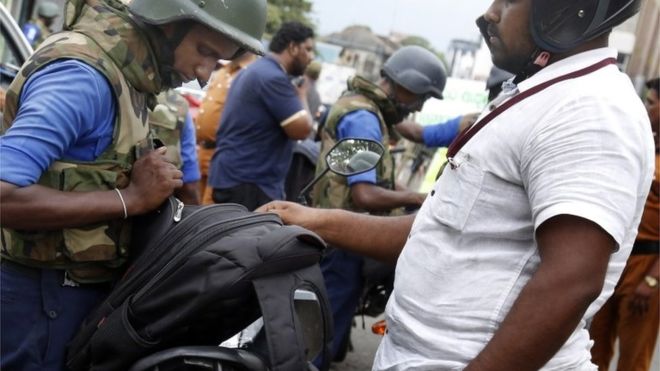Sri Lanka has revised down the death toll from last Sunday’s wave of bombings by more than 100, to “about 253”, the health ministry says.
It blamed a calculation error and the difficulty of identifying victims.
Scores were killed and hundreds injured when suicide bombers struck hotels and churches in Colombo, Negombo and the eastern city of Batticaloa.
Most of those killed were Sri Lankan but dozens of foreigners were also among the casualties.
Nine people are suspected of carrying out the attacks. Police have continued carrying out raids and have issued photographs of seven people wanted in connection with the attacks.
The authorities blamed a local Islamist extremist group, National Thowheed Jamath (NTJ), soon after the blasts but say the bombers must have had outside help.
The Islamic State group said it was behind the attacks and published a video showing eight men but provided no evidence of direct involvement.
In other developments:
- Sri Lanka’s defence secretary, Hemasiri Fernando, the top non-elected official at the department, announced his resignation on Thursday in response to intelligence failures
- Sri Lankan police apologised after mistakenly releasing a photo of US-based student activist Amara Majeed as one of the suspects
- The country’s Catholic Church has announced the suspension of all church services
- Hundreds of refugee Pakistani Ahmadi Muslims, fearing revenge attacks, have been fleeing the city of Negombo, site of one of the blasts
- Police say more than 70 people have now been arrested
- The UK Foreign Office is now warning against all but essential travel to Sri Lanka
Why was the wrong toll given?
Sri Lankan Deputy Defence Minister Ruwan Wijewardene said morgues had provided inaccurate figures.
Another official, the head of health services, told Reuters news agency there had been so many body parts it was “difficult to give a precise figure”.
According to the health ministry, all autopsies had been completed late on Thursday and it transpired that some victims had been counted more than once.
BBC World Service South Asia editor Jill McGivering says the revised figure comes as the government is struggling to restore its credibility – amid criticism of its apparent failure to respond to intelligence warnings before the attacks.
It’s also battling to counter fake news and false rumours about the crisis, she says. This sudden dramatic change in the death toll is unlikely to help.
The downward revision means this no longer ranks as the deadliest attack claimed by IS.
Source: BBC


Comments are closed.